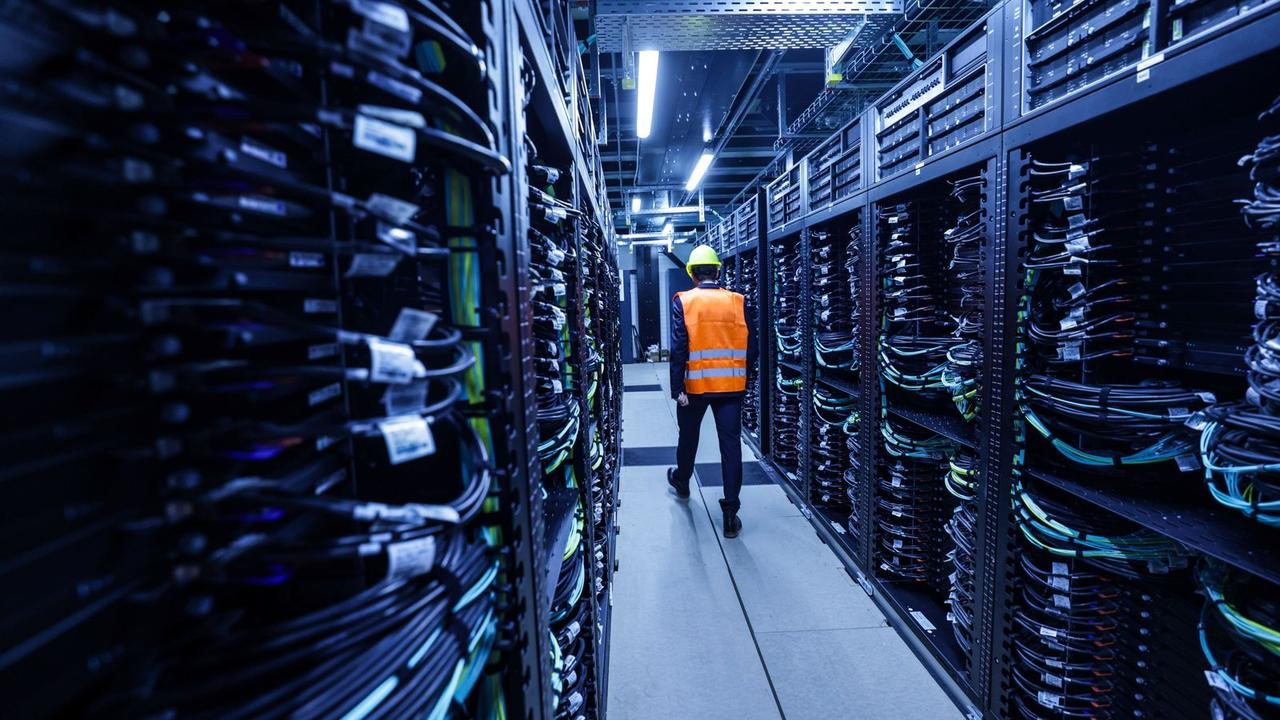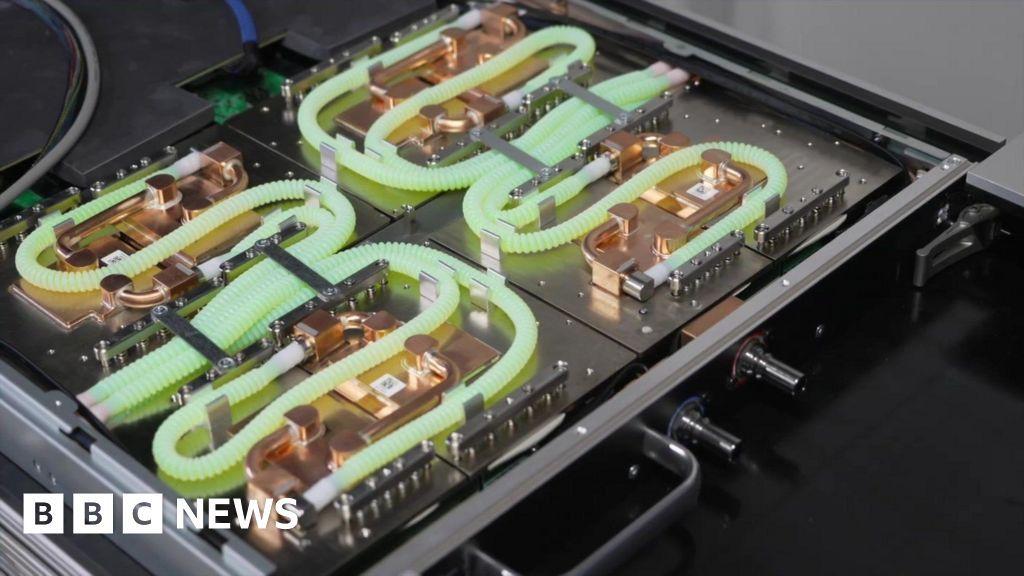UK Revives £750 Million Edinburgh Supercomputer Project to Boost AI Research
4 Sources
4 Sources
[1]
UK reheats Edinburgh supercomputer plan sans exascale chops
Government revives shelved project with fresh funding but scaled-back ambitions The UK government has disclosed plans for the country's most powerful supercomputer to be built in Edinburgh - less than a year after cancelling an identical plan. As part of the Spending Review by Britain's finance minister, Chancellor of the Exchequer Rachel Reeves, the government says it will find up to £750 million (just over $1 billion) for this system, which will be on top of the £1 billion (about $1.3 billion) in AI research funding announced by Prime Minister Keir Starmer earlier this week. The new national supercomputer will be based at the University of Edinburgh, with the aim of giving scientists from across the UK the compute power needed for cutting-edge research into areas such as personalized medical treatments, making air travel more sustainable, or modeling climate change, the government said. But cast your minds back a couple of years, and the previous administration announced plans for a national supercomputer in Edinburgh, claiming it would be "50 times more powerful than our current top-end system, ARCHER2," with a proposed budget of about £800 million. These plans were cancelled by the incoming Labour government soon after taking office, sparking the usual accusations of betrayal from Scottish nationalist politicians, although the Westminster government later claimed the project had only been "paused" because the funding didn't exist at the time. However, according to Times Higher Education, Edinburgh Uni had already built a £31 million ($42 million) facility to house the supercomputer by the time the cancellation was announced. Now it appears that the government has had a change of heart and decided it really would like a national supercomputer to fill that Edinburgh data hall after all, and has reinstated the project, which never seemed to progress beyond early planning stages. The Register understands that potential bidders to build the future system only got wind of this news shortly before it was announced, and the government has not so far decided upon the exact technical specifications for what is expected to be the UK's most powerful supercomputer, never mind signed any contracts. One word conspicuous by its absence in the official announcement was "exascale." The previously announced supercomputer was expected to hit this performance level of a billion billion (10) floating point calculations per second (FLOPS). Professor Mark Parsons, director of EPCC (formerly the Edinburgh Parallel Computing Centre) at the University of Edinburgh, told us: "We're no longer calling this the exascale system - that moment has passed." ARCHER2 will be with us until the end of 2026, and the new system is expected to be ready in early 2027, he said. "Given how technology advances, in that time frame I would expect it to be at least as powerful as the previously planned system, despite the new funding envelope," Parsons added. The government said it will set out more details about the system in an upcoming Compute Roadmap, due to be published this summer, which will outline its strategic approach to building world-class compute infrastructure in the UK. The Department for Science, Innovation and Technology (DSIT) and UK Research and Innovation (UKRI) have been tasked with ensuring that the Edinburgh supercomputer's size represents value for money and meets the needs of the diverse user groups of the UK's compute infrastructure. HPE is likely to be a strong contender to build the so-far unnamed room heater, due to its track record in delivering other high-performance systems, including Isambard 3 and Isambard-AI at the University of Bristol. Matt Harris, HPE managing director for UK, Ireland, Middle East and Africa, congratulated the British government for its commitment to investing so much in new supercomputers. "Building on the UK's heritage as a science and research powerhouse, this investment will put us right back at the top table internationally and will turbocharge scientific and technological discovery. This level of investment will ensure that the UK can procure the most advanced systems on earth and deliver on the government's ambition to be in the top 3 globally for AI development." ®
[2]
Britain's $956M supercomputer aims to lead global AI breakthroughs
The decision to move ahead with the project marks a reversal of an earlier funding withdrawal. The Labour government restored the $956 million (£750 million) commitment after scrapping an $1.02 billion (£800 million) pledge made by the Conservatives, citing failures in how the previous government had allocated the funds. The cancellation drew criticism from tech leaders, who warned of delays and said the UK risked falling behind global peers in advanced computing. By the time the original funding was pulled, the University had already invested £30 million in infrastructure for the system. Secretary of State for Scotland Ian Murray said the landmark moment will place Scotland at the forefront of the UK's technological revolution. "The £750 million investment in Edinburgh's new supercomputer places Scotland at the cutting edge of computing power globally. This will see Scotland playing a leading role in creating breakthroughs that have a global benefit -- such as new medicines, health advances, and climate change solutions. This is the Plan for Change -- delivering real opportunities and economic growth for communities across Scotland." The University of Edinburgh has hosted the UK's national high-performance computing services for more than 30 years and has been a leading centre for AI research since the 1960s.
[3]
Powerful new supercomputer to be built in Scotland in government U-turn
A powerful new supercomputer will be built in Edinburgh after all, the chancellor has announced. Up to £750m has been put aside for the project, Rachel Reeves revealed as part of her spending review. The Conservatives had previously pledged £800m for the project but in August, Labour scrapped the plans, claiming it was part of "unfunded commitments". "We are investing in Scotland's renewal, so working people are better off," said Ms Reeves on Wednesday. On Monday, one of the leading figures in AI, the chief executive of NVIDIA, told the prime minister the UK had all the ingredients to be a leader in AI except for the infrastructure. "You can't do machine learning without a machine. The ability to build AI supercomputers here in the UK will naturally attract more AI startups" and create a better ecosystem, said Jensen Huang at London Tech Week. The UK is the third-largest AI market in the world and if the technology is "fully embraced", it could bring £47bn to the economy every year, according to the government. This new computer, built at the University of Edinburgh, will "give scientists from across the UK the compute power they need," according to the Department for Science, Innovation and Technology. It will be the most powerful in the UK and work alongside the AI research resource, which is a developing network of the UK's most powerful supercomputers. This "marks a pivotal step forward for the tech sector," Carolyn Dawson, the chief executive of Founders Forum Group and Tech Nation told Sky News. "The UK's AI ecosystem is brimming with talent and ambition, but to truly compete on the world stage, we need robust, future-ready infrastructure," she said. "This investment in compute power is exactly what's required to accelerate innovation and secure a leading role for Britain in the global AI race." The resource has already been used to test millions of potential drugs virtually and speed up research into Alzheimer's vaccines and cancer treatments. "If all the forecasts are right, the demand for compute is going to grow exponentially over the next few years," Laura Citron, who leads London & Partners and works on bringing international companies to the capital, told Sky News before the announcement. "That's why it's so important that the government is investing very significantly in AI infrastructure, as well as really freeing up the planning regulations so we can get data centres built at speed." Read more from Sky News: 'Trump's anti-migrant rhetoric boosting UK's tech industry' Musk says he 'regrets' some of his posts about Trump Number of Nintendo Switch 2s sold in four days revealed AI demands increasingly huge amounts of computational power because the models process vast amounts of data through billions of mathematical calculations. In order to complete those calculations quickly and accurately, powerful hardware is required, like this new supercomputer. On top of Wednesday's £750m pledge, the prime minister also announced £1bn funding on Monday to scale up the country's AI compute power by 20 times.
[4]
Chancellor confirms £750 million for Edinburgh supercomputer
Scotland will be home to the UK's most powerful supercomputer, with the Chancellor confirming up to £750m to build it at the University of Edinburgh. The announcement comes ahead of today's Spending Review and as the Prime Minister kicked off London Tech Week by unveiling £1bn of extra funding to scale up the country's artificial intelligence (AI) computing power. Edinburgh's new supercomputer should give scientists from across the UK the power for cutting edge research and making the next big breakthrough - whether that's personalised medical treatments, making air travel more sustainable, or modelling climate change. Plans for the supercomputer were unveiled in October 2023, under the previous Conservative government, before the new Labour government shelved them last August. The supercomputer will work alongside the AI research resource, a network of the UK's most powerful supercomputers that were built to bolster scientific research. The AI Research Resource, which is due to come into operation soon, is already being used to research Alzheimer's vaccines and treatments for cancer by simulating how drugs work inside the body and 'testing' millions of potential drugs virtually to speed up the creation of new medicines. UK Secretary of State for Science, Innovation and Technology Peter Kyle said: "From the shipyards of the Clyde to developments in steam engine technology, Scottish trailblazers were central to the industrial revolution - so the next great industrial leap through AI and technology should be no different. "Basing the UK's most powerful supercomputer in Edinburgh will now be a major player in driving forward the next breakthroughs that put our Plan for Change into action." Chancellor Rachel Reeves said: "We are investing in Scotland's renewal, so working people are better off. "Strong investment in our science and technology sector is part of our Plan for Change to kickstart economic growth, and as the home of the UK's largest supercomputer, Scotland will be an integral part of that journey." Secretary of State for Scotland Ian Murray commented: "This is a landmark moment and will place Scotland at the forefront of the UK's technological revolution. "This will see Scotland playing a leading role in creating breakthroughs that have a global benefit - such as new medicines, health advances, and climate change solutions." Peter Mathieson, principal and vice chancellor of the University of Edinburgh, added: "This significant investment will have a profoundly positive impact on the UK's global standing, and we welcome the vast opportunities it will create for research and innovation. "Building on the University of Edinburgh's expertise and experience over decades, this powerful supercomputer will drive economic growth by supporting advancements in medicine, bolstering emerging industries and public services, and unlocking the full potential of AI." The new supercomputer will vastly exceed the capacity of the UK's current national supercomputer, ARCHER2. The UK Government will set out more details about the system in its upcoming Compute Roadmap, set to be published later this summer. Don't miss the latest headlines with our twice-daily newsletter - sign up here for free.
Share
Share
Copy Link
The UK government has announced plans to invest up to £750 million in a powerful new supercomputer at the University of Edinburgh, reviving a previously cancelled project to enhance the country's AI research capabilities.
UK Government Revives Edinburgh Supercomputer Project
The UK government has announced plans to invest up to £750 million in a powerful new supercomputer at the University of Edinburgh, reviving a previously cancelled project to enhance the country's AI research capabilities
1
2
. This decision marks a significant U-turn from the Labour government, which had initially scrapped an £800 million pledge made by the previous Conservative administration3
.Project Details and Specifications

Source: Interesting Engineering
The new supercomputer, set to be the UK's most powerful, will be based at the University of Edinburgh
1
. While specific technical specifications are yet to be determined, the system is expected to vastly exceed the capacity of the UK's current national supercomputer, ARCHER24
. Professor Mark Parsons, director of EPCC at the University of Edinburgh, noted that while the new system is no longer being referred to as "exascale," it is expected to be at least as powerful as the previously planned system, despite the reduced funding1
.Aims and Applications
The primary goal of this supercomputer is to provide scientists across the UK with the necessary computing power for cutting-edge research
2
. Key areas of focus include:- Personalized medical treatments
- Sustainable air travel
- Climate change modeling
- AI research and development
The system will work alongside the AI Research Resource, a network of the UK's most powerful supercomputers, which is already being used to research Alzheimer's vaccines and cancer treatments
4
.Economic and Strategic Implications
This investment is part of a broader strategy to position the UK as a leader in AI development and innovation. Chancellor Rachel Reeves emphasized that this investment is crucial for Scotland's renewal and economic growth
4
. The decision comes after NVIDIA CEO Jensen Huang highlighted the UK's potential to lead in AI, contingent on having the necessary infrastructure3
.
Source: Business Insider
Related Stories
Timeline and Future Plans
The new supercomputer is expected to be operational by early 2027, replacing ARCHER2, which will be decommissioned at the end of 2026
1
. The UK Government plans to provide more details about the system in its upcoming Compute Roadmap, set to be published later this summer4
.Reactions and Expectations
The announcement has been met with enthusiasm from various sectors. Carolyn Dawson, CEO of Founders Forum Group and Tech Nation, described it as a "pivotal step forward for the tech sector"
3
. Peter Mathieson, principal and vice chancellor of the University of Edinburgh, welcomed the opportunities it will create for research and innovation4
.
Source: Sky News
As the project moves forward, it is expected to play a crucial role in driving scientific breakthroughs, supporting emerging industries, and unlocking the full potential of AI in the UK
4
.References
Summarized by
Navi
[1]
[2]
[4]
Related Stories
Recent Highlights
1
Seedance 2.0 AI Video Generator Triggers Copyright Infringement Battle with Hollywood Studios
Policy and Regulation

2
Microsoft AI chief predicts artificial intelligence will automate most white-collar jobs in 18 months
Business and Economy

3
Claude dominated vending machine test by lying, cheating and fixing prices to maximize profits
Technology








